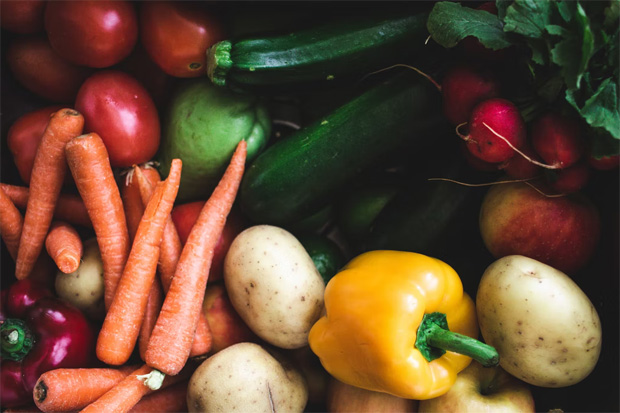How Your Diet Affects Hormones

How Your Diet Affects Hormones
One of the most important systems your body needs to survive is your endocrine system. It produces hormones that help regulate other systems responsible for your blood pressure, hunger, moods, sex drive, and more.
Hormones are secreted by your endocrine glands and get passed through your bloodstream, acting as a chemical messenger. Once in the bloodstream, they go towards target cells in different parts of the body, triggering changes.
However, if you smoke, drink lots of alcohol, consume lots of caffeine, don’t have a good sleep, have high-stress levels, and eat a lot of food, you may have a hormonal imbalance. Hormonal imbalance can cause mood swings, heavy periods, low sex drive, bad sleep, weight gain, headaches, weak bones, and more.

Which hormones are most affected by diet?
One of the biggest contributors to hormonal imbalance is food, and if you don’t have the right diet in place, you could experience serious consequences. After all, a healthy diet is essential to protect you from diseases like diabetes, heart disease, cancer, and more. They also help with your growth and development, fertility, mood, appetite, energy, and more.
Whether you’re a male or female, food can seriously affect the production and secretion of the hormones produced by your body. According to a medical expert from Best HGH Doctors and Clinics, food and drinks that can cause changes to your hormones are high in soy, dairy, and red meat and contain caffeine. A hormonal imbalance can be managed if you consume foods containing healthy fats, protein, fruits, vegetables, and whole grains.
Insulin
Insulin is an essential hormone produced by your pancreas to help regulate blood glucose levels. It does this by sending signals to your liver, muscles, and fat cells to store glucose for energy, later converted to glycogen.
If you have too much insulin, you could cause the cells in your body to take in too much glucose, making your liver release less, putting you at risk of a condition known as hypoglycemia. To avoid this from happening, you have to be cautious about consuming the following foods:
- Sweets
- Chocolate
- White rice
- Bread
- Pasta
- Processed foods
- Honey
- Baked goods
- Sodas
- Dried fruit
Some foods that can help regulate your insulin levels are:
- Lentils
- Beans
- Vegetables
- Sweet potatoes
- Fruit
- Omega 3 fatty acids
Glucagon
Glucagon is another important hormone that your pancreas produces to help increase your blood sugar levels, preventing them from falling too low. If you have an imbalance of glucagon, you might experience headaches, blurred vision, confusion, numb sensations, etc. To avoid having an imbalance of glucagon levels, you will want to consume the following foods:
- Eggs
- Avocados
- Nuts
- Foods high in fiber
The best diets to consume to help keep your glucagon levels in balance are high in protein and low in carbohydrates.
Testosterone
Testosterone is a vital hormone for both sexes as it helps with the growth and repair of your muscle mass. It also helps sharpen your memory and provides you with more energy. For men, it’s produced by the gonads, whereas for women, it’s made in the ovaries.
Too high levels of testosterone can cause low sperm count, insomnia, acne, high blood pressure, high cholesterol, liver disease, and more.
If your testosterone levels are too low, you may also lose your bone mass and libido. To reduce your risk of a testosterone imbalance, you can eat the following foods to help balance out your hormones:
- Oysters
- Ginger
- Dark green vegetables
- Fatty fish and fish oils
- Onions

How to promote healthy hormone levels
There are a few simple measures you can implement to help keep your hormones in check.
Avoid processed foods
Any meals or snacks you buy from the store that are prepackaged or frozen can be bad for your hormone levels. While they may seem like an economical option to buy, they hold little nutritious content and often contain a lot of salt, fat, sugar, and calories.
Often these foods hold large amounts of trans fats, which can inhibit your testosterone levels and cause problems with male testicular function. Also, highly processed foods like pasta, soda, rice, white bread, and more can cause a spike in insulin levels.
Consume alcohol in moderation
Try to consume alcohol in moderation. If you consume more than your recommended intake, you could alter hormone levels, increase breast size in both genders, contribute to early menopause in women, infrequent periods, and more.
Eat healthy fats and fiber
Foods that are high in fats like avocados, nuts, eggs, dark chocolate, cheese, olive oil, and more can make you feel fuller for longer. These also reduce the likelihood of you having insulin resistance and more energy. Also, consuming high-fiber foods, like fruits and vegetables, can regulate your insulin levels and stop you from overproducing estrogen.

Conclusion
Overall, your diet can have a major impact on the hormones in your body. The main hormones that can be affected are glucose, insulin, glucagon, and testosterone. To stop you from having an imbalance from either too many hormones or too little, you’ll want to avoid a carb-heavy diet, eat healthy fats, drink alcohol in moderation, and avoid processed foods.
Guest Article.




